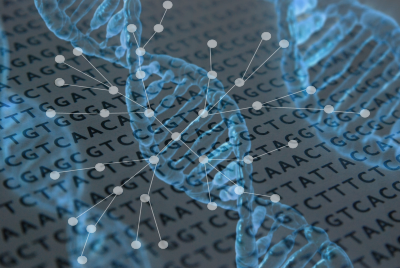Overview
 The main focus of the laboratory is the development of novel approaches to understand the biological mechanisms that underlie cancer genesis, cancer evolution and cancer treatment resistance. We design and combine bioinformatics approaches, computational strategies and algorithms for the analysis of next generation sequencing and high-density array data, and systems biology methods. We are particularly interested in exploiting our analyses to identify prognostic and predictive cancer biomarkers.
The main focus of the laboratory is the development of novel approaches to understand the biological mechanisms that underlie cancer genesis, cancer evolution and cancer treatment resistance. We design and combine bioinformatics approaches, computational strategies and algorithms for the analysis of next generation sequencing and high-density array data, and systems biology methods. We are particularly interested in exploiting our analyses to identify prognostic and predictive cancer biomarkers.
Research Directions
-
Determinants of cancers
Regulatory regions mediate a variety of cellular processes at the transcriptional, post-transcriptional, and post-translational levels. Inherited polymorphisms and somatic aberrations within regulatory elements can affect regulatory mechanisms impacting gene expression and were shown to increase cancer susceptibility and to drive progression. We design and implement novel computational strategies to understand the intricate links between inherited polymorphisms and somatic events. -
Liquid biopsies
Plasma DNA contains circulating tumor DNA (ctDNA) released from widespread tumor cells, that potentially uncovers full cancer heterogeneity. We design ad-hoc assays and develop advanced computational methods to generate and analyze next generation sequencing data obtained from plasma DNA. -
Allele-specific expression in cancer
Allele-specific expression (ASE) is a common phenomenon observed in human cells where transcription originates predominantly from one allele. Although many studies showed that ASE is essential for cellular programming a development as well as for the diversity of cellular phenotypes, limited studies have explored the role and impact of ASE in cancer genesis and progression. We analyze genomes of thousands of patients’ cancer cells to deeply investigate ASE phenomena in cancer and identify cancer specific ASE genes and cancer specific ASE patterns.
Group members
- Alessandro Romanel, PI
- Davide Dalfovo, PhD student
- Riccardo Scandino, PhD student
- Fabio Mazza, PhD student (co-supervised with Gianluca Lattanzi)
- Filippo Gastaldello, Master student, QCB
- Matteo Marchesin, Master student, UNIPD
- Ilaria Massignani, Bachelor student, STB
- Lorenzo Simeone, Bachelor student, STB
- Aurora Grassi, Bachelor student, UNIVR
Grants
2020-2024, Ministero della Salute, Ricerca Finalizzata
2018-2023, AIRC MFAG
Selected publications
D. Dalfovo, R. Scandino, M. Paoli, S. Valentini, A. Romanel. Germline determinants of aberrant signaling pathways in cancer. npj Precision Oncology 2024.
D. Dalfovo, A. Romanel. Analysis of Genetic Ancestry from NGS Data Using EthSEQ. Current Protocols, 2023.
R. Scandino, F. Calabrese, A. Romanel. Synggen: fast and data-driven generation of synthetic heterogeneous NGS cancer data. Bioinformatics, 2023.
S. Valentini, F. Gandolfi, M. Carolo, D. Dalfovo, L. Pozza, A. Romanel. Polympact: exploring functional relations among common human genetic variants. Nucleic Acids Research, 2022.
S. Valentini*, C. Marchioretti*, A. Bisio*, A. Rossi, S. Zaccara, A. Romanel#, A. Inga#. TranSNPs: a class of functional SNPs affecting mRNA translation potential revealed by fraction-based allelic imbalance. iScience, 2021.
D. Dalfovo, S. Valentini, A. Romanel. Exploring functionally annotated transcriptional consensus regulatory elements with CONREL. Database: The Journal of Biological Databases and Curation, 2020.
N. Casiraghi*, F. Orlando*, Y. Ciani, J. Xiang, A. Sboner, O. Elemento, G. Attard, H. Beltran, F. Demichelis#, A. Romanel#. ABEMUS: platform specific and data informed detection of somatic SNVs in cfDNA. Bioinformatics, 2020.
S. Valentini, T. Fedrizzi, F. Demichelis, A. Romanel. PaCBAM: fast and scalable processing of whole exome and targeted sequencing data. BMC Genomics, 20:1018, 2019.
A. Romanel. Allele-Specific Expression Analysis in Cancer Using Next-Generation Sequencing Data. Cancer Bioinformatics, Methods in Molecular Biology, Springer 1878:125-137, 2019.
A. Romanel*, S. Garritano*, B. Stringa, M. Blattner, D. Dalfovo, D. Chakravarty, D. Soong, K.A. Cotter, G. Petris, P. Dhingra, P. Gasperini, A. Cereseto, O. Elemento, A. Sboner, E. Khurana, A. Inga, M.A. Rubin, F. Demichelis. Inherited determinants of early recurrent somatic mutations in prostate cancer. Nature Communications, 8:48, 2017.
A. Romanel*, D. Gasi Tandefelt*, V. Conteduca, A. Jayaram, N. Casiraghi, D. Wetterskog, S. Salvi, D. Amadori, Z. Zafeiriou, P. Rescigno, D. Bianchini, G. Gurioli, V. Casadio, S. Carreira, J. Goodall, A. Wingate, R. Ferraldeschi, N. Tunariu, P. Flohr, U. De Giorgi, J.S. de Bono, F. Demichelis#, G. Attard#. Plasma AR and abiraterone-resistant prostate cancer. Science Translational Medicine 7 312re10, 2015.
A. Romanel, S. Lago, D. Prandi, A. Sboner, F. Demichelis. ASEQ: fast allele-specific studies from next-generation sequencing data. BMC Medical Genomics 8(1):9, 2015.
